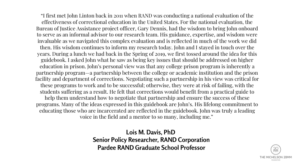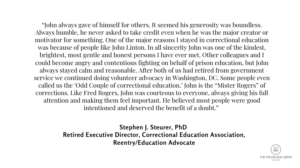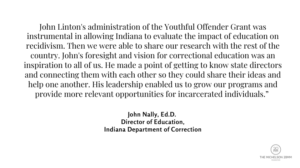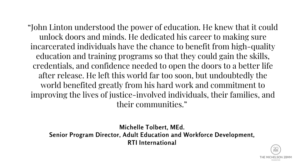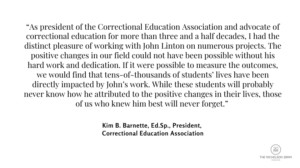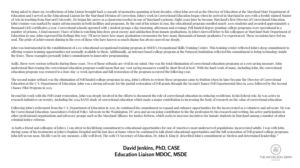On May 15, 2019, John Linton and Lois Davis approached the Michelson 20MM Foundation about a research idea to address a needed professional development gap in advancing quality higher education in prison programming. Linton, who served as Director of the Office of Correctional Education in the U.S. Department of Education (ED), and Davis, a senior policy researcher at RAND Corporation, are nationally recognized experts in the field of correctional education.
“Postsecondary education is vitally important in terms of preparing individuals in prison for so many careers. Any in-prison college program fundamentally needs to be a partnership between colleges and corrections,” Linton said, “There needs to be guidance for corrections officials on how to ensure the success of these programs.”
“There is an underemphasis on partnership between higher education and corrections,” Davis added. “There is little guidance on what correctional officials should look for in higher education partners, even less guidance on creating the formal memorandum of understanding between colleges and prisons.” As a result of this conversation, Michelson 20MM awarded a Spark Grant to the RAND Corporation to create a guide supporting prison officials in establishing high-quality college educational programs in prison.
The recently released guide, “What Corrections Officials Need to Know to Partner with Colleges to Implement College Programs in Prisons,” was co-authored by Linton and Davis until his passing in September 2019.
“John spearheaded the idea of this guide and believed strongly that such guidance would help make in-prison college programs a true partnership between corrections and colleges,” said Davis. “Unfortunately, John passed away before this guide could be completed. However, many of the ideas presented here are based on his valuable input.”
Remembering a Legacy
Trained as a reading teacher, Linton began his professional career in Maryland prisons. He became the Director of the Education and Library programs in Maryland’s adult prisons, working first in Maryland’s Department of Public Safety and Correctional Services. He rose to become the Director of Correctional Education at the Maryland State Department of Education.
Linton’s passion and life’s work was to deliver educational opportunities to students in prison. He continued to pursue that passion as the Director of the Office of Correctional Education in the ED Office of Career Technology and Adult Education. In this role, he worked to reestablish higher education opportunities in prison through Second Chance Pell. Linton provided leadership for the ED involving educational services to U.S. correctional populations. He also represented the ED in a work group supporting the cabinet-level federal Reentry Council. He was commended by the 10th U.S. Secretary of Education Dr. John B. King, Jr. as having displayed “tireless and determined leadership.”
Honoring Linton’s Memory
Davis noted that Linton viewed the success of higher education in prison as inherently a partnership program between colleges and corrections. “He felt that corrections would benefit from a practical guide to help them understand how to negotiate that partnership and ensure the success of these programs,” Davis said. “His lifelong commitment to educating those who are incarcerated is reflected in the guidebook.”
Stephen J. Steurer fondly recalled that he and Linton were called the “odd couple of correctional education,” noting that Linton was one of the major reasons he stayed in correctional education. An executive director of the Correctional Education Association and now a reentry/education advocate, Steurer said of his close friend, “John was the ‘Mister Rogers’ of corrections —courteous to everyone, always giving his full attention, and making them feel important.”
“John’s foresight and vision for correctional education was an inspiration to all of us,” said John Nally, a director of education for the Indiana Department of Correction. “His leadership enabled us to grow our programs and provide more relevant opportunities for incarcerated individuals.”
“If it were possible to measure the outcomes, we would find tens-of-thousands of students’ lives have been directly impacted by John’s work,” said Kim B. Barnette, president of the Correctional Education Association.
“A fond memory I have of John is watching him draw great energy and satisfaction from inmate graduations,” said David Jenkins, a longtime friend and colleague of Linton’s. “In John’s farewell letter to his colleagues at Maryland State Department of Education in 1991, John expressed his feelings this way: ‘I’ll never know how many graduation ceremonies for how many thousands of inmate graduates I’ve experienced. These occasions have fed my soul. The pride of achievement shining in the eyes of those who have known so much shame has always moved me deeply.’”
Michelle Tolbert, senior program director of adult education at RTI International, said, “John Linton understood the power of education. He knew that it could unlock doors and minds. He left this world far too soon, but undoubtedly the world benefited greatly from his hard work and commitment to improving the lives of justice-involved individuals, their families, and communities.”
“John Linton was a giant in correctional education,” said Phillip Kim, CEO of the Michelson 20MM Foundation. “This guide will continue to honor his legacy and contributions to the field for years to come.”
Colleagues and Friends Remember Linton
- Lois M. Davis
- Stephen J. Steurer
- John Nally
- Michelle Tolbert
- Kim B. Barnette
- David Jenkins
An Event to Support Corrections Officials
Advancing quality postsecondary education in prison is at the root of the Michelson 20MM Smart Justice approach. Please join us and the RAND Corporation on September 16th for “College Education in Prison: A How-To Guide for Corrections Officials.” This event will feature key takeaways from the RAND guide co-authored by Davis and Linton. Davis will moderate a panel of corrections officials and higher education practitioners who will share lessons learned and best practices. Click here to register.
Michelson 20MM is a private, nonprofit foundation seeking to accelerate progress towards a more just world through grantmaking, operating programs, and impact investing. Co-chaired and funded by Alya and Gary Michelson, Michelson 20MM is part of the Michelson Philanthropies network of foundations.


